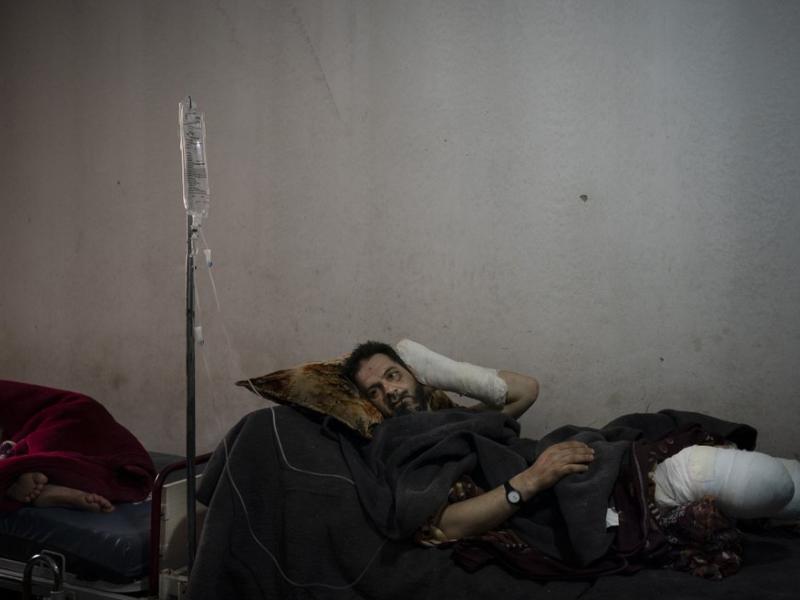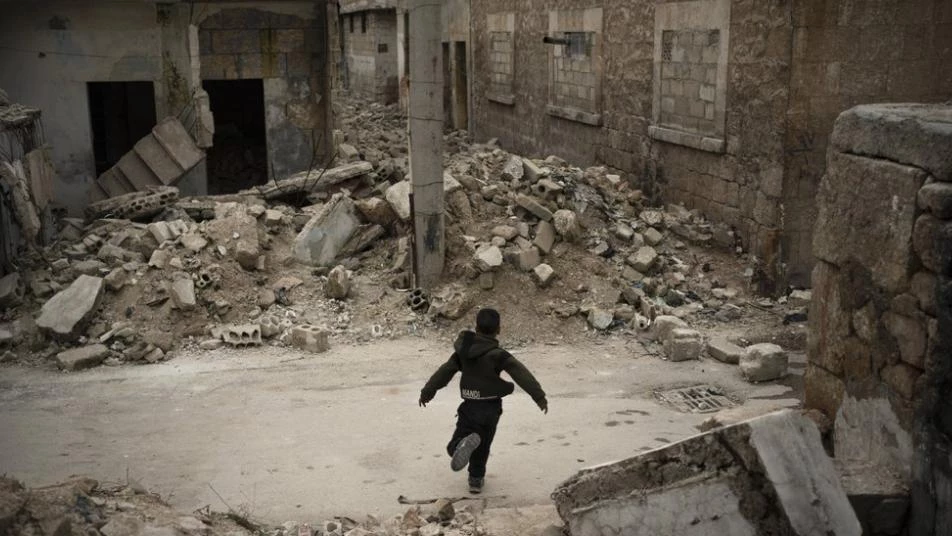“I feel everything has ended, and this is a final migration, not displacement,” Aboud said. “I feel let down by the world.”
It was a far cry from the house, the farm, and the job that he, his wife and three children left behind two months ago, fleeing their hometown just 15 kilometers (9 miles) down the road as it was overwhelmed by Assad regime troops in furious fighting. He managed to salvage some jerrycans of olives, a few rugs, cushions and pots and pans, and his motorbike. They sold their washing machine and some of his wife’s gold.
Now they were moving into an apartment in a district full of buildings shattered by Assad bombardment. He and his wife and three kids will share the place with over a dozen relatives. They’re jobless in a city teeming with thousands of others displaced like them — and they are hardly out of danger.
The city of Idlib is the last urban area still under opposition control in Syria, located in a shrinking opposition enclave in the northwestern province of the same name. Syria’s war, which entered its 10th year on Monday, has shrunk in geographical scope — focusing on this tiny corner of the country — but the misery wreaked by the conflict has not diminished.
The Assad-Russian offensive has been paused by a Russian-Turkish cease-fire deal, leaving residents in a state of terrifying limbo. They are skeptical that the cease-fire will last and well aware they are likely the next target of the regime’s assault.
Driving into Idlib city, the AP team witnessed the scale of the displacement. Dozens of tents lined the main road into the city. Other families were crammed into bombed out buildings, the city’s stadium or unfinished construction sites. Shops have sprung around the enclave bearing the names of different cities and towns in Syria — a testimony and a token to the homes they left behind.
Aboud said it was out of the question for him to accept “reconciliation.” Holding his 2-year-old twins by the hand, he said his family fled his hometown of Saraqeb “not fearing death but fearing to be under the rule of Assad again.”
He took part in the early anti-Assad protests in 2011 and was detained for it; two of his brothers were shot and killed by regime militias in 2012; his mother-in-law was killed in an airstrike the same year.
If Assad captures Idlib, “we will run to Turkey, we will sleep under the (border) wall,” Aboud said. “The most crucial thing is that we won’t enter territories” held by the regime.
The massive displacement of past weeks has strained international aid deliveries into the enclave, where 1.5 million receive food assistance. In January alone, 1,227 trucks were sent across the border from Turkey, the largest number in seven years of cross-border operations, said UN Assistant Secretary of State Kevin Kennedy, who is also regional humanitarian coordinator for Syria.
At Idlib’s Central Hospital, Abdullah AlHassan lay in a bed in excruciating pain. He lost both legs last week when he went back to his village, Afes, to inspect the home he had fled and stepped on a mine planted in the house. His hand was also bandaged and his face full of cuts.

Afes, on the strategic highway that was the regime’s first main objective in its offensive, was all but destroyed and totally deserted, he said. His house had been looted, even metal wires stripped out. The carnage will be similar if the offensive hits Idlib city, he said.
No one can stay once such an attack comes. Everyone must leave. If anyone stays, regime militias won’t spare him.
In the center of Idlib city, nearly 90 displaced families found refuge in a deserted prison. They fled here from Maaret al-Numan.
Families, men and women, live on top of each other in the prison rooms, divided into sleeping, cooking and bathing areas by hung sheets and blankets, giving a deceptive sense of privacy.
Fida, 44, and her 20-year old daughter Heba share the same room with 11 other relatives. On the day the AP visited, they were stuffing zucchini and eggplants in their living area, where they also cook and bathe — taking turns keeping watch to ensure no one intrudes. A younger brother of Heba who lost a foot in a war injury slept in the room behind the “kitchen.” A baby with Down syndrome slept in his cradle next to the women cooking.
They had long resisted fleeing their home, just outside Maaret al-Numan. Early in the war, when Heba was 12, they left for six months, but returned. Earlier in 2019, they were displaced for 20 days but again went back. When the Syrian army advanced on Maaret al-Numan in December, they moved into caves just next to their home, hoping it was again just temporary.
When an airstrike hit just outside the cave, they knew they had to leave. They gave up their large farm growing olives and grapes to live crammed in a prison.
“We don’t like the word displacement,” Fida said. Her daughter added: “It’s shameful. We like our hometown.”
Heba said she can’t forget a single day since 2011 — every day marked by violence and loss. She worried about her children, a 3- and a 2-year-old, and can’t let them go outside because of airstrikes.
“We sleep in fear,” she said. “I don’t imagine there will be a future. I don’t imagine this will be settled with us alive.”
Based on AP



التعليقات (0)